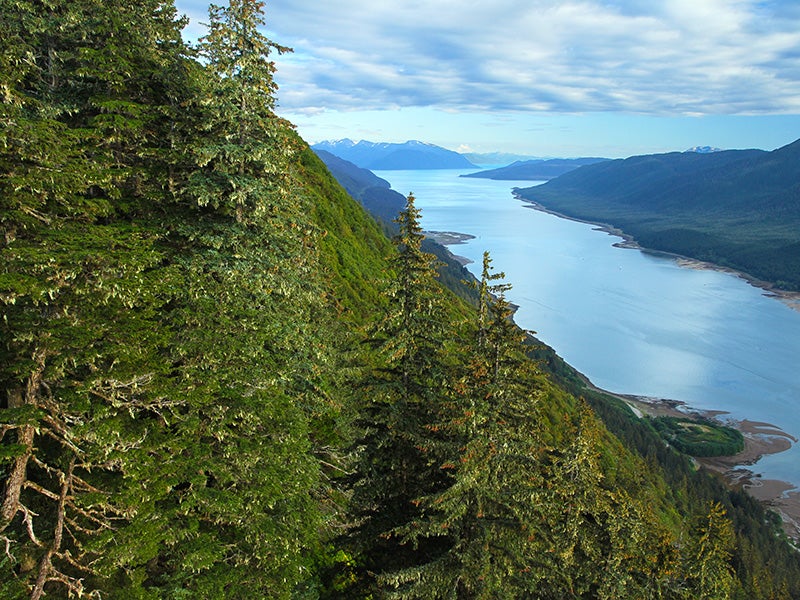USDA Announces Effort to Strip National Forest Protections in Alaska
The agency plans an Alaska-only version of Roadless Rule that will open wildlands to logging
Contact
The U.S. Department of Agriculture (USDA) today announced that it intends to create a special rule to undermine safeguards for the Tongass and the Chugach National Forests, prized expanses of glaciers, fjords and old-growth rainforest spanning more than 22 million acres in Alaska. The USDA seeks to create an “Alaska state-specific” version of the Roadless Rule, signaling a gift to a couple of timber companies that will mire the U.S. Forest Service in unprecedented, costly and needless controversy for years to come.
The Tongass and the Chugach are incredible state and national resources that support Alaska’s booming and profitable tourism, recreation and fishing industries. They play a vital role in capturing excess carbon from the atmosphere and mitigating some of the impact of global warming, among other massive environmental benefits. The wildlands of these forests are a treasured natural resource that should be valued and protected from the destruction of logging.
“Today’s announcement is the first step down a path that will force U.S. taxpayers to expand their subsidy of the Tongass timber program with tens of millions of dollars every year,” said Earthjustice attorney Holly Harris. “The protection of old-growth forests in the wildlands of Southeast Alaska is essential for the region’s tourism, recreation and fishing industries, which account for more than 35 times the number of jobs than the small but destructive timber industry. Allowing logging in these wildlands will make a bad situation worse. U.S. taxpayers are already being forced to pay millions for an industrial logging program that contributes less than 1 percent in total employment-related earnings to the region.”
The Roadless Rule ensures that areas that are vital for Southeast Alaska’s thriving tourism industry as well as commercial fishing, sport hunting and fishing, and recreation remain off limits to logging. These sustainable industries are Alaska’s future. They have long surpassed industrial-scale logging as the region’s main economic drivers, and they depend on healthy watersheds and wildlands of the Tongass and the Chugach.
The Roadless Rule also protects areas of vital importance to Alaska Natives across the region. By ensuring clear-cut logging does not destroy these areas, the Rule protects fish and wildlife habitat for vital subsistence uses, customary and traditional cultural venues, and sacred spiritual sites.
Finally, the Roadless Rule saves the taxpayers enormous amounts of money. USDA adopted the Roadless Rule, in large part, because the Forest Service had to stop building wasteful roads at taxpayer expense. In Alaska, the rationale is even more compelling given the cost of building and maintaining roads greatly exceeds the value of the timber, and requires unconscionable federal taxpayer subsidies.
Part of the overwhelming public support for the Roadless Rule (resulting from more than 600 public hearings around the nation and more than 1.6 million public comments) stems from the fact that it balances important protections with commonsense exemptions for roads for communities, hydropower and utility corridors, and mining (among others). This practical approach to public land management is working well in Southeast Alaska. According to the Forest Service, as of March 2017, 53 projects within the roadless area in Alaska had been submitted, and all were approved, typically within a month of submission. This is includes 34 mining projects, 10 hydropower or utility connection projects, roads, and a geothermal lease.
USDA tried to exempt the Tongass from the Roadless Rule in the early 2000s and failed. Today the logging industry contributes less to the regional economy than it did then, so this idea makes even less sense now, nearly two decades later. The wildlands of the Tongass and Chugach should remain protected because they support our communities, provide the foundation for thriving economic drivers, and support social, cultural and aesthetic values in unique and profound ways.
Reporter Resource
The Tongass has faced numerous other attacks by friends of the timber industry. Read more about these recent attacks and how the Tongass has benefitted from the Roadless Rule.

Additional Resources
About Earthjustice
Earthjustice is the premier nonprofit environmental law organization. We wield the power of law and the strength of partnership to protect people's health, to preserve magnificent places and wildlife, to advance clean energy, and to combat climate change. We are here because the earth needs a good lawyer.